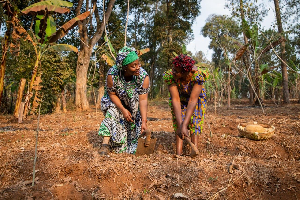Participants at a stakeholders forum on enhancing Public Accountability and Environmental Governance have urged state institutions to urgently minimise the delays associated with rendering public because it is a major source of corruption.
They said patrons of the service who had challenges with the waiting time tended to pay their way through to facilitate the process but to the detriment of those who did not have the means to do likewise.
“To end this corruption the authorities must identify all the loopholes, which create opportunities for a few and retard progress,” Sheikh Abdul Rashid an Imam said.
The forum, organised by the La Dadekotopon Municipal Directorate of the National Commission on Civic Education (NCCE) with support from the Municipal Assembly, was to empower community members to demand for accountability from duty bearers as well as to enable them to report all acts of corruption to the appropriate authorities.
The participants also called for innovative measures, including a naming and shaming campaign as well as speedy prosecution to make corruption unattractive to every citizen.
The forum forms part of the Commission’s Anti-Corruption, Rule of law and Accountability Programme (ARAP) and the National Anti-Corruption Action Plan (NACAP) initiatives.
The ARAP programme, funded by the European Union (EU), is targeted at reducing corruption and improving accountability and compliance of citizens to the Rule of Law across in the country.
Officials of the NCCE, Commission on Human Rights and Administrative Justice (CHRAJ), opinion leaders, as well as the public and the Member of Parliament for the La Dadekotopon Constituency, Mr Vincent Odotei Sowah, attended the event.
Mrs Evelyn Kutorkor Gyima, a Senior Investigator at the Greater Accra Regional office of CHRAJ, however, urged the participants to take advantage of the many anti-corruption laws to report offenders.
She explained that it would be impossible to investigate and prosecute offenders without the requisite information from those with knowledge on their activities.
“The institutions that have been set up cannot function in isolation. The NCCE, CHRAJ, Police and other mandated institutions need the support of the public through the information they will divulge and that will enable them to fight against the canker,” she said. “Reporting is very critical in if the fight against corruption is to be won”.
Mr Odotei Sowah, for his part, said corruption was a canker, which retrogressed national development.
He noted that even though the phenomenon existed across the world, with strong and workable institutions the canker could be minimised.
Mr Odotei Sowah also urged the public to show interest in the fight by demanding for accountability from their leaders at the Municipal and District Assembly levels.
Mrs Gloria Amarkie Kudo, the Municipal Director of NCCE for LaDMA, said the Commission would ensure that all recommendations from such programmes from across the country were compiled and forwarded to the appropriate authorities for the necessary actions.
The Commission would also continue to engage the public to receive feedback on the implementation of those recommendations. “This is to promote a bottom-up approach to fighting corruption and ensuring accountability for the development of our nation,” she said.
General News of Wednesday, 25 September 2019
Source: ghananewsagency.org













